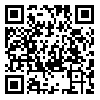Volume 6, Issue 1 (Iranian south medical of journals 2003)
Iran South Med J 2003, 6(1): 1-7 |
Back to browse issues page
Download citation:
BibTeX | RIS | EndNote | Medlars | ProCite | Reference Manager | RefWorks
Send citation to:



BibTeX | RIS | EndNote | Medlars | ProCite | Reference Manager | RefWorks
Send citation to:
Aghaebrahimian M, Roostaee M H, Soleiman Jahi H, Zandi K. Nucleic acid-based immunization with herpes simplex virus type-1 genes specifying glycoproteins gB-1 and gD-1. Iran South Med J 2003; 6 (1) :1-7
URL: http://ismj.bpums.ac.ir/article-1-101-en.html
URL: http://ismj.bpums.ac.ir/article-1-101-en.html
1- , rustaimh@modares.ac.ir
Abstract: (26555 Views)
Herpes Simplex Virus type -1 (HSV-1) of human causes important diseases in its hosts. Because of emerging of new strains of HSV-1 which are resistant to current antiviral drugs it is necessary to produce an effective vaccine. Different vaccines have been produced to prevent HSV-1 infections of which DNA vaccines are among suitable candidates.The aim of this project was to evaluate the immunogenicity of individual clones including pcDNA3-gD-1 and pcDNA3-gB-1, which carry gD-1 gene or gB-1 gene respectively. At the same time attempts were made to test the immunogenicity of combination of both clones. Three groups of susceptible BALB/c mice each including 10 mice were inoculated with either clone or combination of them separately. Three injections with 21-day intervals were given to each of mice. Blood samples were collected immediately before and 21 days after each injection and all blood samples were tested for HSV-1 neutralizing antibodies. At the same time 3 more groups of 10 BALB/c mice were used as controls of which one group was injected with standard HSV-1 strain of KOS (as positive control) and other groups received either empty plasmid or PBS and used as negative controls. Twenty - one days after last injections all test and control mice were challenged with 1.65 MLD50 of wild - type HSV-1. Results of virus neutralization test and resistance to challenge of each group were compared.Based on data obtained from this project it was shown that each of clones or combination of them were able to induce protective immunity in the test animals against wild-type of HSV-1. The level of HSV-1 antibody reached its highest level after third injection whereas, mice receiving combined clones showed higher level of neutralizing antibody than the other test groups. No neutralizing antibody was produced in negative control mice and their resistance to challenge virus was much less than that of the test groups or positive control.
Keywords: DNA vaccine, Herpes Simplex Virus type-1 (HSV-1), glycoprotein D & B (gD & gB), pcDNA3-gD-1 & pcDNA3-gB-1 clones
Type of Study: Original |
Subject:
General
Received: 2009/01/19 | Accepted: 2009/01/19 | Published: 2009/01/19
Received: 2009/01/19 | Accepted: 2009/01/19 | Published: 2009/01/19
Send email to the article author
| Rights and Permissions | |
 |
This work is licensed under a Creative Commons Attribution-NonCommercial 4.0 International License. |





